Legend of Zelda Title Localization Discussion
2
YQII
FAKKU Translator
Five and a half years ago in November of 2011, I wrote a blog post discussing the titles of the Zelda games and how the English names often vary from the original Japanese. What motivated me back then was the upcoming release of Skyward Sword, and last year after watching Nintendo's E3 presentation for the next console installment in the series, I decided to revisit my old post. I sorta forgot about it for almost a year, but now that Breath of the Wild is just around the corner, I once again came back to this post, updated it a bit more, and now I can finally share it here with the FAKKU community.
Let me start off by saying that I don't claim to be an expert of the series in any way. I've only ever played the 3D console games (OoT, MM, WW, TP, and SS) and recently A Link Between Worlds on the 3DS, and I never invested an awful lot of time collecting every single heart piece or completing all of the side quests after the N64 era. I do, however, know a thing or two about translations and JP>EN localization. I've always been fascinated by localization of media, and I became interested in the Zelda series and decided to look into its various titles a couple of years ago.
This is the result of those sleepless night I spent reading fan sites and Japanese wiki pages. I'll go into some history and bring up some tidbits here and there, but this will mainly be about the difference between the official Japanese title and the English titles of all the games in the series. Quite a few of them differ greatly, so I think you'll find it interesting if you're a fan of the series in any way, or if you for some reason enjoy localization trivia as much as I do.
For every game, I'm going to list the year (years for multiple versions) of its release (R), the official English title (E), the Japanese title (J), and finally a very literal J>E translation (T). After that I'll go into detail about the title, discussing the change itself and the reasoning behind it when applicable, as well as any other information I find interesting enough to share. As you will notice, almost all of the Japanese titles follow the same structure with "The Legend of Zelda" followed by an "A no B" subtitle. The "A no B" grammar shows possession (A is the owner of B) or attributes (B has the properties of A). The way this is translated vary in the English versions, but for the sake of consistency, I will always use the "B of A" structure when listing the literal translation. An example being "Ocarina of Time" rather then "the Time Ocarina."
With the introduction out of the way, let's get started!
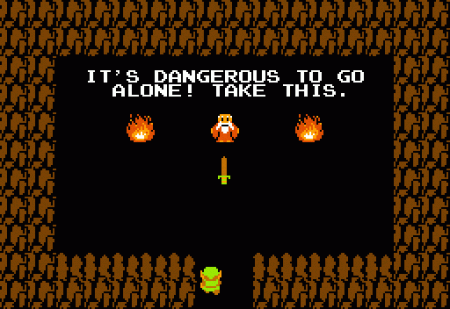
R: 1986, 1994
E: The Legend of Zelda
J: THE HYRULE FANTASY: Zelda no Densetsu (1)
T: The Hyrule Fantasy: Legend of Zelda (1)
The first game in the series came out in 1986 as a launch title for the new Famicom Disk System, a floppy disk peripheral for the Famicom. The Disk System is one of many add-ons that never made it outside of Japan, so the game received a Western release in cartridge form the following year for the Nintendo Entertainment System (NES), and was also later re-released in Japan a few years later (1994) as a cartridge based game.
The main thing you'll notice here is that the Legend of Zelda was actually the subtitle in the original game. I can only speculate, but to me this would suggest that "The Hyrule Fantasy" was the intended main series, and the Legend of Zelda was just one of the stories planned to take place in the land of Hyrule. Whatever the case may be, the title "The Hyrule Fantasy" only stuck around for a year, and it was gone once the second game in the series was released in 1987.
By the time the game was released in the West, the sequel was already out in Japan under the series new name. Granted the localizers ignored half of the title in the English version, but here I'm willing to make an exception and think it was a perfectly reasonable thing to do. The Legend of Zelda had become the name of the series with the release of Zelda II, and this wasn't one of those cases where the titles were changed simply for the sake of convenience.
This being the Zelda games in many regards, you can play a version of it on almost every device imaginable. Excluding the two original versions, it's also been ported to the Gamecube (as part of the Zelda Collector's Edition), Game Boy Advanced, and the Wii, Wii U, and 3DS Virtual Console. In addition to these actual ports, you can also play it to some degree in Animal Crossing and Super Smash Bros Brawl, and of course there's also the NES Remix games.
I won't list them all, but if you own any Nintendo console released in the 2000s, you can probably play most of the old 2D games on it.
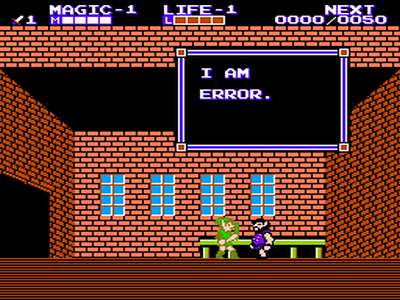
R: 1987
E: Zelda II: The Adventure of Link
J: The Legend of Zelda 2: Rinku no Bouken
T: The Legend of Zelda 2: Adventure of Link
There isn't much to say about this title, as it's basically just a direct translation. If I'm to nitpick, I suppose one could complain that they missed the "The Legend of" part in the Western release and just called it "Zelda II." Also Roman numerals make for cooler sequel titles here.
After this, all the titles—Japanese and English—have "The Legend of Zelda" in their name, so I will start omitting them and only list the sub titles from this point on.
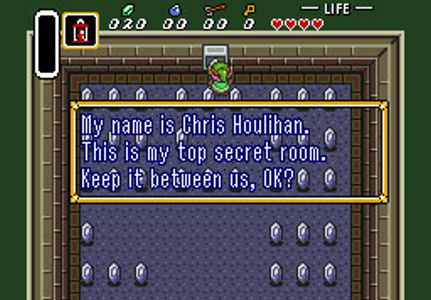
R: 1991
E: A Link to the Past
J: Kamigami no Toraifoosu
T: Triforce of Gods
This is where things get interesting. The Triforce is an object of divine origin, and this was apparently the game that introduced the back-story with each piece representing one of the Goddesses that created the world of Hyrule. Thus, the original title makes perfect sense.
From what I understand, it's common to this day for Nintendo games to have their content altered in order to remove any reference to religion for their Western release, and this change was a result of that policy. It wasn't the first time religion affected the translation of a Zelda game—nor the last. "The Book of Magic" was simply known as "The Bible" in the first game, and the music in Ocarina of Time fire temple was changed due to what sounded like "religious chanting" in the original version.
Religion is and always has been a touchy subject, so while I get why they came up with a new title, that doesn't change the fact that it's completely different.
This was the game that motivated me to write this lengthy rant. Not only was the original title completely discarded and replaced with something else, the name has also caused a lot of confusion. I like lore and mysteries surrounding most forms of media, so I've read my fair share of theories regarding the Zelda chronology. There's some fun reading to be had if you're into that kind of stuff, but the title of this game is misused as a reference in a lot of theories.
Note: This rant was originally written in November of 2011, and just over a month later Nintendo would release an official timeline, detailing the chronological order of the games and confirming the split timeline theory. I will leave the following three paragraphs more or less unchanged from my original post, since the concepts discussed are interesting even if the theories themselves have since been debunked.
In retrospect, it's worth pointing out that I was correct in my skepticism, and this game's rightful place is in the middle of the official timeline. It is the first part in a sense, but it's only the first of one of the three branching paths following the timeline split in Ocarina of Time.
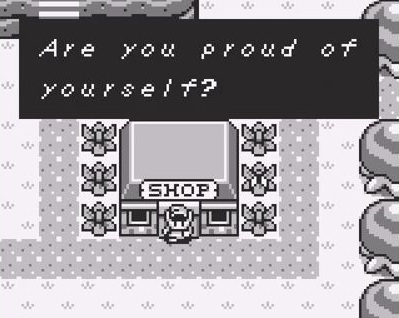
R: 1993, 1998
E: Link's Awakening (DX)
J: Yume wo Miru Shima (DX)
T: Island Where One Dreams (DX)/ Dreaming Island (DX)
Truth be told, I don't understand the reasoning behind this localization at all. Link finds himself on an island, which is actually the dream of something called the Wind Fish. "Dream Island" or "Island of Dreams" would both be suitable titles in my opinion. The English title itself is somewhat weird as well. The whole game takes place in a dream, yet its title refers to the act of waking up. Also, wouldn't it be the Wind Fish that awakens, and not Link? Apparently, Link was dreaming as well, and the game ends with an "it was all a dream" ending. This means the title is nothing but a big spoiler.
Now that I think about this some more here in 2017, I suppose it's possible they wanted to keep the title similar to Link's Adventure. Another reason for the change could have been to avoid a conflict with the Kirby series. The very first game, Kirby's Dream Land, came out exactly one year before Link's Awakening, so it actually makes a whole lot of sense for Nintendo of America to not want to follow that up with what would essentially be "Link's Dream Island." Here's the kicker though: Kirby's Dream Land was released as "Kirby of the Stars" in Japan, and the series is still know as that, including the recently released Planet Robobot.
If this was the actual reasoning behind the change, it's an example of exactly why I strongly advocate against haphazardly making up your own title when localizing a product. It almost always comes back to bite you in the ass in the future, so just stick with the original when there's no good reason to change it.
This game was released on the Game Boy and later re-released on the Game Boy Color with the "DX" suffix. The title is the same in both versions.
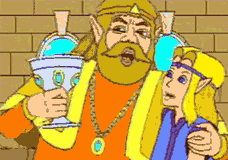
Bonus: Zelda on the CD-i
I'm sure that by now most people have already seen the infamous cut-scenes from these games on Youtube. Nintendo themselves don't consider the three games that were released on Philip's CD-i to be part of the Zelda series, and pretty much everyone looks at them as nothing more than franchise exploitation. I tend to agree, but given the spirit of this rant, I have to say that if nothing else, they at least got the titles right.
We haven't seen that much of it yet, but a common theme in future Zelda titles is to include some sort of noun with some sort of property. The Ocarina of Time, the Mask of Majora, the Princess of Twilight, and so on. In this aspect, these games stay very true to the source material. In 1993, Link: The Faces of Evil and Zelda: The Wand of Gamelon were both released, and the Wand of Gamelon in particular is an extremely Zelda-esque title. The following year Zelda's Adventure was released, and while it's a very cliche and boring adventure game title, it does pay proper homage to Zelda II: the Adventure of Link.
In a bizarre way, it's almost as if the CD-i games set what would become the standard of Zelda titles for the next 25 years.
There are no Japanese version, so I can't compare titles. The games may be horrible, but at least they had appropriate titles!
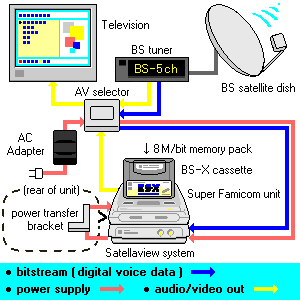
Bonus: Zelda on the Satellaview
I stumbled across this while browsing through old Zelda games. In 1995, Nintendo released the Satellaview add-on to the Super Famicom. As I understand it, Nintendo would at certain times broadcast a signal from a satellite that you could pick up using a receiver—literally getting the games beamed down to you from space. I'm sure this was a very radical concept back in '95, and during its five year lifespan, a few Zelda games were "released" through this service. The Satellaview on the other hand was never released outside of Japan, so there are no English titles to compare with. Looking back, perhaps this was a good thing, seeing how they were known as "BS Legend of Zelda"... Still, I thought it was a fun thing to bring up, and if you're interested, you can read more on Wikipedia.
The word "innovation" has become a bit worn-out nowadays when speaking about Nintendo, and sometimes I wish I could play my games with a plain old controller, but seeing things like this and the Virtual Boy, it's hard to call them anything but innovative. I just hope I don't have to do something like plug the NX Switch into my smartphone to play games in the future... Update: I won't have to!
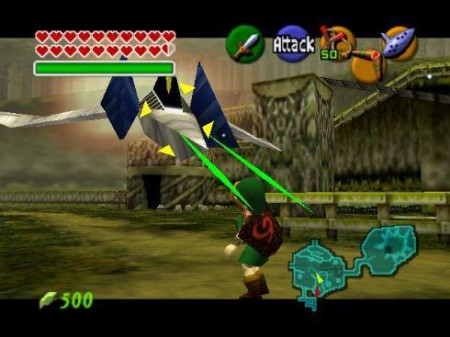
R: 1998, 2002, 2003, 2007, 2011, 2015
E: Ocarina of Time (3D)
J: Toki no Okarina (3D)
T: Ocarina of Time (3D)
This was the first Zelda game I ever played, and what a game it was. I was around 10 at the time, and it was simply packed with amazing things: a huge world to explore, challenging puzzles, a vibrating controller, an immersing story, time traveling, the idea that adulthood sucks, goddamn skulltulas that gave me nightmares—all in wonderful, blocky 3D! This was back when 3D meant "three dimensional" and not gimmicky "it's coming out of the screen!" effects that strain my poor old weary eyes. Not only is it widely accepted as one of the best game ever made, the English translation of the title is also perfect, so this is a GOTYAY in my book—although my actual favorite game of all times is a tie between Super Mario World and Yoshi's Island on the SNES, which I credit mostly to nostalgia.
A Nintendo Gamecube port was released in 2002, called "Ocarina of Time GC Ura" in Japanese, and "Ocarina of time Master Quest" in English. "GC" simply stands for Gamecube, but the "Ura" is from Ura Zelda (Another Zelda), the working title for an Ocarina of Time expansion planned to be released on the 64DD. This was another less-than successful peripheral that only had a short 14 month lifespan in Japan, and it added a disk drive to the Nintendo 64. After Nintendo discontinued it in 2001, some of the work that had been done on Ura Zelda was moved to the Gamecube port. Seeing how the original is just based on the Japanese working title and has nothing to do with the story of the game, I don't really mind how they change the subtitle to Master Quest for the Western release.
The game was once again ported in 2003 to the "Divine Gaming Machine" Shén Yóu Ji, or the iQue Player as it's known in the English speaking world. I don't know much about the console itself, but it's basically an official Chinese version of the N64 developed by Nintendo in an attempt to combat piracy. While I can't read Chinese, I believe that å¡žå°”è¾¾ä¼ è¯´ï¼šæ—¶å…‰ä¹‹ç¬› is a simple translation of the same old "The Legend of Zelda: Ocarina of Time" title.
You think this game has had enough ports yet? Well, clearly not. The N64 version has since been ported twice to both the Wii and Wii U Virtual Console in 2007 and 2015. And finally, a 3D version was release in 2011 for the Nintendo 3DS, so now you can play 3D in 3D. None of these had any weird name changes as far as I know.
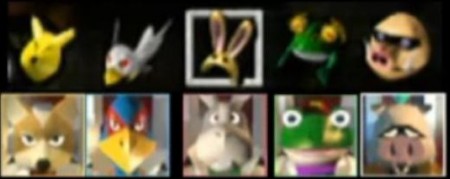
R: 2000, 2003, 2009, 2015, 2016
E: Majora's Mask
J: Majora no Kamen
T: Mask of Majora
Y2K came and we didn't all die. And what's more, we got a new Zelda game to kick off the new millennium! Yeah, it wasn't as great as Ocarina of Time, but I still had lots of fun doing all the side quests and finding all those mask—although I have to admit that I bought a guide for the game. It got the same kind of ports that OoT.
Once again, there's nothing to complain about when it comes to the title. It seems like they just got everything right on the good old N64.
Perhaps we're past the point where we get illogical, made-up titles for—
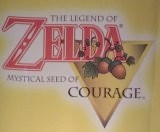
R: 2001
E: Oracle of Seasons/Ages
J: Fushigi no Ki no Mi: Daichi no Shou/Jikuu no Shou
T: Seed of Mystery: Earth Chapter/Space-Time Chapter
Oh wow, we just hit the motherload. Before moving on to perhaps the most confusing titles in the Zelda series, let's have a look at the trilogy that became a duology.
Oracle of Seasons focus on what seems to be an incarnation of the Goddess Din, while Oracle of Ages has Nayru. The idea is that you play the games separately, and then link them together to unlock new content and whatnot. A neat concept, but what happened to Farore? There are three pieces of the Triforce, and accordingly three Goddesses. Farore was going to have her own game, and it was planned to be released later on. You were also meant to be able to link this game with the other two, unlocking even more features. Apparently this was no easy task for the developers, and the idea was scrapped due to problems linked to this linking of the games. Link!
An early title for what was going to be the "Triforce Trilogy" was "Mystical Seed of Power/Wisdom/Courage," with each game featuring one of the Goddesses and a different theme: Power had a seasons theme, Wisdom had colors, and Courage had time. When they couldn't make all games work together, they kept Power more-or-less the same, scrapped Courage, and put its time theme into Wisdom. Also they included Farore as the "Oracle of Secrets" in both games—the one in charge of the secrets that were revealed by linking the two versions. The "Oracle of Secrets" seems like a last-minute solution, and I find it unlikely that this would've been the name of third game had everything gone according to plans. If anything, the scrapped third game (Courage) would've been the one named Oracles of Ages, and the second game (Wisdom, and what is now Oracle of Ages) would've been something else. Oracle of Colors seems like a reasonable option.
With that (kinda) sorted out, let's talk about the titles. Like I mentioned before, almost all the Zelda game titles has something to do with a noun with some property. In this case, we had a seed (or nut) of mystery/wonders. Someone must've made the decided that the Western world wasn't ready for a sub-title within a sub-title yet, so the "Seed of Mystery" part was dropped. Also I suppose both nut and seed have connotations that were best avoided in an English release.
That leaves us with the "Earth Chapter" and "Space-Time Chapter" from the original titles. Rather than referring to the two two games as chapters, they were named after the oracles in each version. I can see how the original would be a bit weird, so Earth was changed to Seasons and Space-Time to Ages. Instead of two titles that sound like they have nothing to do with each other, we now end up with two that are very similar. Still, what's with the original?
At least according to the creation story told in Ocarina of Time, Din create the land. Din being the Oracle of Earth makes sense, but Din was never the problem here. Nayru brought the law to the land Din created, and Farore filled the land with all living being. Neither creating the laws of physics nor creating life has much to do with time, but apparently the developers thought so. I suppose they just decided to give the space-time attribute to one of the Goddesses while working on this game, but Farore was originally meant to have this power. Surely this decision was based on something (remember that Din was associated with the earth three years before this game was released), and if so, did they simply ignore it and alter the lore just because they couldn't get the hardware to work properly?
The Oracle series is pretty damn confusing. What's more, it's going to be back to haunt us three years after its release...
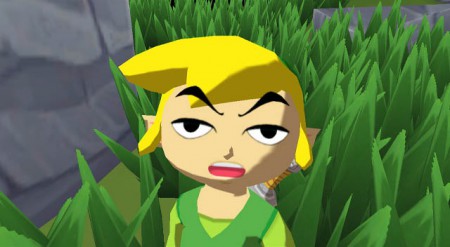
R: 2002, 2013
E: The Wind Waker
J: Kaze no Takuto
T: Baton of Wind
This is the black sheep of the 3D console titles. Again, Nintendo has an obvious theme with their titles, and for some unmotivated reason, it's changed in the English version. In Ocarina of Time we control time using an ocarina. In Wind Waker we control the wind using a baton. Why not call it "Baton of Wind"?
Update: I feel like I was a bit harsh in my original commentary on this game. I already knew back then that the "Baton of Wind" is called the "Wind Waker" in the English version, so both titles refer to the same item. I honestly think the Wind Waker is a good name for the Baton of Wind, so I don't have a problem with this title anymore.
The game received an HD remake in 2013 for the Wii U, and all they did to the titles was adding HD at the end.
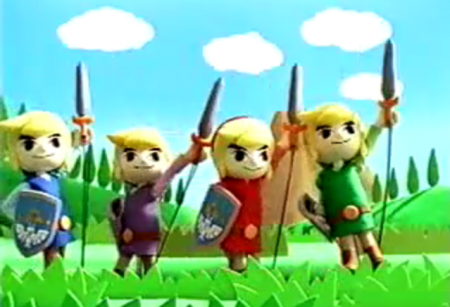
R: 2003, 2004, 2011
E: A Link to the Past & Four Swords (GBA), Four Swords Adventures (GCN),
Four Swords Anniversary Edition (DSi & 3DS DLC)
J: Kamigami no Toraifoosu & Yottsu no Tuurugi, Yottsu no Tsurugi+
Yottsu no Tsurugi: 25 Shuunen Kinen Edition
T: Triforce of Gods & Four Swords, Four Swords+
Four Swords: 25 Year Commemoration Edition
Originally released as a Game Boy Advance port of A Link to the Past with the multiplayer game Four Swords included. The A Link to the Past title is just as bad as it was 10 years earlier, but I think it was too late to try to fix it at that point. At least I'm happy with the Four Swords title. A sequel to Four Swords was later released on the Gamecube, known as + (Plus) in Japan, but "Adventure" elsewhere. I guess "plus" implies some sort of add-on, and this was a new game. A reasonable change.
The original two-games-in-one version was re-released in 2011 as downloadable content for the current generation of Game Boys. There's nothing new to comment on when it comes to the title. These are kinda unremarkable, so let's move on to something more infuriating.
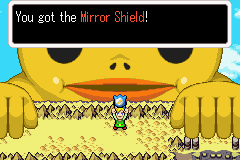
R: 2004
E: The Minish Cap
J: Fushigi no Boushi
T: Hat of Mystery
Sounds familiar? Yep, this looks like a throwback to the oracle series, but this time it's a mysterious cap rather than a nut. Just like in those games, the title is changed a bit, although in this case they both refer to a headpiece, and I assume it's the same in-game item. Seeing how they completely dropped the mystery aspect of the title in the Oracle games, I suppose they were free to take some liberties with this title.
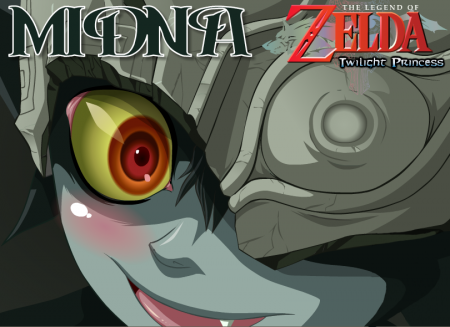
R: 2006
E: Twilight Princess
J: Towairaito Purinsesu
T: Twilight Princess
By this point, I like to imagine that Nintendo had come to realize that it's best to not to let anyone else handle the localization of their game titles. Whether it's because of that or because they just think it sounds cooler this way, all the home console games would have English titles from this point onward.
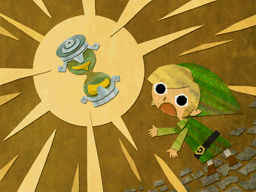
R: 2007, 2015/2016
E: Phantom Hourglass
J: Mugen no Sunadokei
T: Hourglass of Illusions
This is a direct sequel to the Wind Waker, so it makes perfect sense to have a similar title structure for the two games. Had they called the other one Waker of the Wind, I have a feeling this would be called Hourglass of Illusions or something similar. I can't really complain about anything when it comes to the title.
I believe this is the Zelda game I know the absolute least about. I don't think I've even seen any real gameplay videos. It apparently made its way to the Wii U virtual console fairly recently, and considering it's a direct sequel to Wind Waker, I might give it a shot on there—assuming it's not all getting shut down following the release of the Switch.
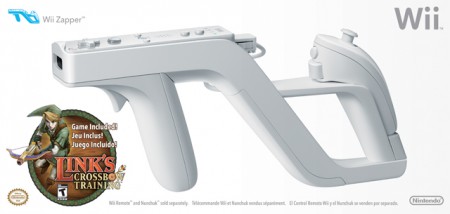
R: 2007
E: Link's Crossbow Training
J: Rinku no Bougan Toreeningu
T: Link's Bow-gun/Crossbow Training
In 2007, Nintendo released their Zapper controller shell—joining the ranks of the Wii Wheel and golf clubs as yet another inconveniently-shaped chunk of plastic that will take up an entire drawer. Basically it's shaped like a machine gun with the Wii Mote placed horizontally in the barrel, and the Nunchuk sitting vertically at the handle.
Link's Crossbow Training came included with the Zapper itself, and I'm sure slapping a Zelda sticker on the box helped sales a bit. Although outside of this spin-off title, Zelda is at its core a sword and board RPG, so it feels like a bit of a mismatch for the series to promote a laser gun accessory. I've only seen it played once at my sister's place, and from the look of it, the game is nothing more than a "how to use the zapper" mini game. Fortunately she's a fan of the Resident Evil series, and got some use out of the Zapper in those games. While it probably would've made more sense, maybe Nintendo didn't want to scare away potential buyers by putting a zombie on the box and including a Resident Evil game.
The two titles are identical, but something I overlooked in my original post is the potential wordplay. Not only does Link no Bougan (Link's Crossbox) sound similar to the title of the second game in the series, Link no Bouken (Link's Adventure), the "gan" part in Bougan means "gun," and "ken" in Bouken could mean "sword"—although the two words use completely different kanji (険 vs. 剣). Maybe a bit far-fetched, but I think it's a fun coincidence if nothing else.
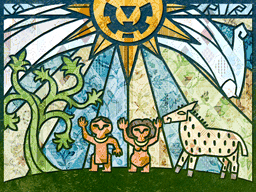
R: 2009, 2015/2016
E: Spirit Tracks
J: Daichi no Kiteki
T: Steam Whistle of the Earth
This a sequel to Phantom Hourglass, which in turn is a sequel to Wind Waker, so the same title logic applies here as well. The big difference though is that the Japanese and English titles aren't even remotely similar. They both refer to trains in a way, but that's about it.
The game takes place in New Hyrule, which was discovered after the events in Phantom Hourglass. In this new land, the Triforce seems to have been replaced with the "Symbol of the Spirits"—the symbol seen inside the sun in the picture above. It also introduces a new divinity: the "Spirits of Good" (or "Gods of Light" in the Japanese version). With the absence of the Triforce, it's unlikely that "the Earth" in the title refers to the old Goddess Din like in the Oracle series. The Japanese word can also mean "land," and it seems like the different regions of the game are called Land of Forest, Land of Fire, and so on in the Japanese version. These are called Forest Realm etc. in the North American version, and Forest Land etc. in the European release.
The in-game "Steam Whistle of the Earth" is simply called "Flute of The Earth" (or perhaps "Land") in Japanese, but "Spirit Flute" in the English version. It's the key item of the game, and like in almost every other game, the Japanese sub-title refers to this key item. From what I understand, the actual steam whistle on the train is only used to scare away cows from the tracks. I don't see why they chose to name the game after the steam whistle, when the main item is just called the flute. Steam whistle in Japanese is steam + flute, so it's reasonable to assume that they just added "steam" to associate the title with the Spirit Train, which also plays a major role in the game.
Out of the three games in this "new world" series (Wind Waker, Phantom Hourglass, Spirit Tracks), this is the one where the title changed most drastically during localization. The Spirit Tracks are the railroad tracks that you travel on with your train, and the Spirit Flute is used to restore those tracks. The two are closely related, but by the same logic, you could've called Ocarina of Time "The Legend of Zelda: Sage Medallions"; you play the ocarina in order to get access to the temples, which in turn you do to gather medallions to progress the story. Ultimately though, I think this comes down to the fact that Spirit Tracks is a more appealing title than Earth Flute.
If you're like me and are considering playing through this New Hyrule saga, this game is also available on the Wii U Virtual Console.
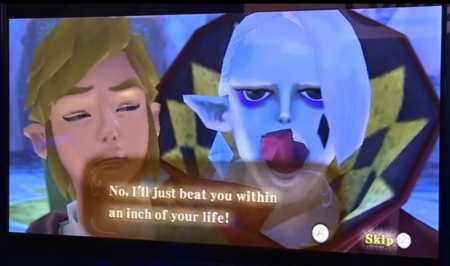
R: 2011
E: Skyward Sword
J: Sukaiwaado Soodo
T: Skyward Sword
Just like the last console game, the Japanese title is in English. In fact, all the box art I've seen from the game appears to use the Western alphabet exclusively.
In celebration of what was the 25 year anniversary of the Zelda series, Nintendo released a limited edition version of the game, including a golden Wii Mote with built-in Wii Motion Plus, as well as a CD featuring music from the Anniversary Symphony which took place a month before the launch of the game.
We've gotten three new games since 2011, so the following are new additions to this list.
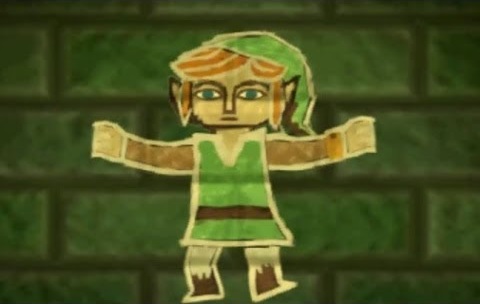
R: 2013
E: A Link Between Worlds
J: Kamigami no Toraifoosu 2
T: Triforce of Gods 2
This is a sequel to A Link to the Past, which is made abundantly clear by the Japanese title being exactly the same with a 2 added at the end. Of course, after the last title was drastically altered, they had to once again do something different this time. Rather than me speculating on how this change come to be, I will simply quote from an Iwata Asks interview where the people involved in the making of the game discuss the title:
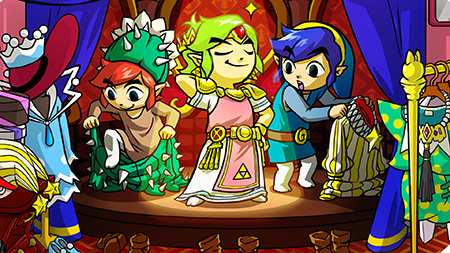
R: 2015
E: Tri Force Heroes
J: Toraifoosu 3 Juushi
T: The Three Triforce Musketeers
While the previous entry was an indirect sequel to 1991's A Link to the Past, this is a direct sequel to A Link Between Worlds. They came up with a new Japanese sub-title this time, and in case you're wondering, yes, the game shares its title with the classic French novel... except for the Triforce part. This was quite possibly the reason they felt like they had to change it up a bit in the Western release, and instead of Three Musketeers, we simply got Heroes.
I had absolutely no idea this had any connection with previous games in the series, but maybe I would have if I had known the original titles when they came out. The Japanese titles have a nice thing going for them in that they're called Triforce something, Triforce something 2, and Triforce something 3—which perhaps makes this the true Triforce Trilogy after the issues with Oracles leading to there only being two games in that series. Sadly, this connection is lost in the English versions.
One thing that stands out in the English title is that Triforce is spelled as Tri Force, which is probably nothing more than an attempt to keep the "three" in there.
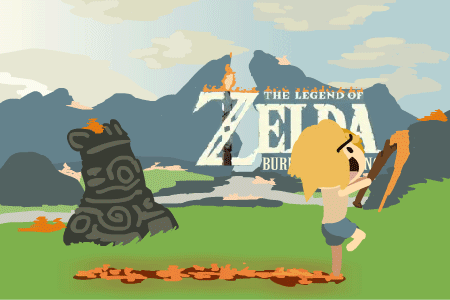 Source
Source
R: 2017 (Tomorrow!)
E: Breath of the Wild
J: Buresu obu za Wairudo
T: Breath of the Wild
All that's left is for us to have a look at the upcoming 19th game in the main series, and what is there to say really? Once again, there's no Japanese title, so there's nothing to critique from a localization standpoint—except for the seemingly inexplicable decision to include both Japanese and English voice overs, but not giving players the option to chose unless they change the language setting of the entire system. The game is however a departure from the classic formula of naming it after a key item or person, and instead the title gets its name from nature itself. Nintendo made it very clear that this was a deliberate choice, and a lot of their 2016 E3 reveal focused on how much emphasis they've put on the world itself this time around. Based on the E3 coverage—I have for most parts avoided spoilers since then—it looks like the Sheikah Slate is going to be the key item of this game, and I personally think Breath of the Wild sounds a lot nicer than naming the game after Link's iPhone.
As for the game itself, it most certainly stole the show for me at last year's E3, and I'm glad to see that Nintendo isn't trying to be too... let's just call it innovative with the Switch. With the constant deluge of praise following its first proper reveal, and as the 10/10s start to drop now that the review embargo has been lifted, Breath of the Wild seems to not only have the makings of a great game, but be a possible contender for best-in-series (once you disregard nostalgia).
Hype aside, I'm fairly certain that early adopters of the Switch will find it sitting on their shelves gather dust for the better part of 2017, unless you're content with filling in the AAA gaps with indie titles (personally I was happily surprised to hear that SteamWorld Dig 2 is on its way for the console). Naturally you could always go for the Wii U option, but I still plan on picking up a Switch first thing tomorrow morning, because it's goddamn Zelda.
[color=#9D0A0A]Final Thoughts[/color]
That rounds up all of the main entries and a decent number of spin-off titles from the 30 year-old history of Legend of Zelda games. I'm sure I've sunk dozens of hours into this pet project of mine over the years, but I do find the results interesting. I can't think of many other series where it's possible to write over 6,000 words while (for most parts) only focusing on the titles of the games. Especially when you take into consideration just how massive of a phenomenon Zelda has become over the decades, where fans have done pretty much everything imaginable within and outside of the games. Makes you wonder what else can be found if you expand beyond the titles and look at the games in their entirety, but that's an undertaking I'm going to leave up to someone else.
The timeline debate that started all this may have been dead for half a decade now, but I believe what came out of it at least had some influence on my own thoughts and policies regarding localization. Funny to think how something as innocent as the Zelda games would have in impact on what I do every day as an ero manga translator. Finally, no matter how you feel about the franchise on a personal level, I would argue that it has certainly earned the status of a living legend of our time.
Let me start off by saying that I don't claim to be an expert of the series in any way. I've only ever played the 3D console games (OoT, MM, WW, TP, and SS) and recently A Link Between Worlds on the 3DS, and I never invested an awful lot of time collecting every single heart piece or completing all of the side quests after the N64 era. I do, however, know a thing or two about translations and JP>EN localization. I've always been fascinated by localization of media, and I became interested in the Zelda series and decided to look into its various titles a couple of years ago.
This is the result of those sleepless night I spent reading fan sites and Japanese wiki pages. I'll go into some history and bring up some tidbits here and there, but this will mainly be about the difference between the official Japanese title and the English titles of all the games in the series. Quite a few of them differ greatly, so I think you'll find it interesting if you're a fan of the series in any way, or if you for some reason enjoy localization trivia as much as I do.
For every game, I'm going to list the year (years for multiple versions) of its release (R), the official English title (E), the Japanese title (J), and finally a very literal J>E translation (T). After that I'll go into detail about the title, discussing the change itself and the reasoning behind it when applicable, as well as any other information I find interesting enough to share. As you will notice, almost all of the Japanese titles follow the same structure with "The Legend of Zelda" followed by an "A no B" subtitle. The "A no B" grammar shows possession (A is the owner of B) or attributes (B has the properties of A). The way this is translated vary in the English versions, but for the sake of consistency, I will always use the "B of A" structure when listing the literal translation. An example being "Ocarina of Time" rather then "the Time Ocarina."
With the introduction out of the way, let's get started!

R: 1986, 1994
E: The Legend of Zelda
J: THE HYRULE FANTASY: Zelda no Densetsu (1)
T: The Hyrule Fantasy: Legend of Zelda (1)
The first game in the series came out in 1986 as a launch title for the new Famicom Disk System, a floppy disk peripheral for the Famicom. The Disk System is one of many add-ons that never made it outside of Japan, so the game received a Western release in cartridge form the following year for the Nintendo Entertainment System (NES), and was also later re-released in Japan a few years later (1994) as a cartridge based game.
The main thing you'll notice here is that the Legend of Zelda was actually the subtitle in the original game. I can only speculate, but to me this would suggest that "The Hyrule Fantasy" was the intended main series, and the Legend of Zelda was just one of the stories planned to take place in the land of Hyrule. Whatever the case may be, the title "The Hyrule Fantasy" only stuck around for a year, and it was gone once the second game in the series was released in 1987.
By the time the game was released in the West, the sequel was already out in Japan under the series new name. Granted the localizers ignored half of the title in the English version, but here I'm willing to make an exception and think it was a perfectly reasonable thing to do. The Legend of Zelda had become the name of the series with the release of Zelda II, and this wasn't one of those cases where the titles were changed simply for the sake of convenience.
This being the Zelda games in many regards, you can play a version of it on almost every device imaginable. Excluding the two original versions, it's also been ported to the Gamecube (as part of the Zelda Collector's Edition), Game Boy Advanced, and the Wii, Wii U, and 3DS Virtual Console. In addition to these actual ports, you can also play it to some degree in Animal Crossing and Super Smash Bros Brawl, and of course there's also the NES Remix games.
I won't list them all, but if you own any Nintendo console released in the 2000s, you can probably play most of the old 2D games on it.

R: 1987
E: Zelda II: The Adventure of Link
J: The Legend of Zelda 2: Rinku no Bouken
T: The Legend of Zelda 2: Adventure of Link
There isn't much to say about this title, as it's basically just a direct translation. If I'm to nitpick, I suppose one could complain that they missed the "The Legend of" part in the Western release and just called it "Zelda II." Also Roman numerals make for cooler sequel titles here.
After this, all the titles—Japanese and English—have "The Legend of Zelda" in their name, so I will start omitting them and only list the sub titles from this point on.

R: 1991
E: A Link to the Past
J: Kamigami no Toraifoosu
T: Triforce of Gods
This is where things get interesting. The Triforce is an object of divine origin, and this was apparently the game that introduced the back-story with each piece representing one of the Goddesses that created the world of Hyrule. Thus, the original title makes perfect sense.
From what I understand, it's common to this day for Nintendo games to have their content altered in order to remove any reference to religion for their Western release, and this change was a result of that policy. It wasn't the first time religion affected the translation of a Zelda game—nor the last. "The Book of Magic" was simply known as "The Bible" in the first game, and the music in Ocarina of Time fire temple was changed due to what sounded like "religious chanting" in the original version.
Religion is and always has been a touchy subject, so while I get why they came up with a new title, that doesn't change the fact that it's completely different.
This was the game that motivated me to write this lengthy rant. Not only was the original title completely discarded and replaced with something else, the name has also caused a lot of confusion. I like lore and mysteries surrounding most forms of media, so I've read my fair share of theories regarding the Zelda chronology. There's some fun reading to be had if you're into that kind of stuff, but the title of this game is misused as a reference in a lot of theories.
Note: This rant was originally written in November of 2011, and just over a month later Nintendo would release an official timeline, detailing the chronological order of the games and confirming the split timeline theory. I will leave the following three paragraphs more or less unchanged from my original post, since the concepts discussed are interesting even if the theories themselves have since been debunked.
First of all, should you really base the chronological order of something on its title? No, you shouldn't. Titles are only a few words that sometimes sum up the jist of the story, or just something that sounds cool. Just look at all the series with "The Last" or "Final" in their titles. As long as the product sells well, you'll most likely see a sequel in a few years. Hell, there are like 20 "Final Fantasy" games. There's nothing "final" about it.
If you want to place one part of a series on a timeline, you do so based on the story; not the title. Even more so when you're working with something that has been translated, because things like this may have happened where the title has nothing to do with the original.
Claims that this game belongs at the beginning of the timeline due to the "past" or "a link (as in connection) to the past" annoys me a lot more than it should. Again, this is the main part of the rant. The rest won't be quite as wordy... at least not until we get to the mess that is the "Oracles" series...
If you want to place one part of a series on a timeline, you do so based on the story; not the title. Even more so when you're working with something that has been translated, because things like this may have happened where the title has nothing to do with the original.
Claims that this game belongs at the beginning of the timeline due to the "past" or "a link (as in connection) to the past" annoys me a lot more than it should. Again, this is the main part of the rant. The rest won't be quite as wordy... at least not until we get to the mess that is the "Oracles" series...
In retrospect, it's worth pointing out that I was correct in my skepticism, and this game's rightful place is in the middle of the official timeline. It is the first part in a sense, but it's only the first of one of the three branching paths following the timeline split in Ocarina of Time.

R: 1993, 1998
E: Link's Awakening (DX)
J: Yume wo Miru Shima (DX)
T: Island Where One Dreams (DX)/ Dreaming Island (DX)
Truth be told, I don't understand the reasoning behind this localization at all. Link finds himself on an island, which is actually the dream of something called the Wind Fish. "Dream Island" or "Island of Dreams" would both be suitable titles in my opinion. The English title itself is somewhat weird as well. The whole game takes place in a dream, yet its title refers to the act of waking up. Also, wouldn't it be the Wind Fish that awakens, and not Link? Apparently, Link was dreaming as well, and the game ends with an "it was all a dream" ending. This means the title is nothing but a big spoiler.
Now that I think about this some more here in 2017, I suppose it's possible they wanted to keep the title similar to Link's Adventure. Another reason for the change could have been to avoid a conflict with the Kirby series. The very first game, Kirby's Dream Land, came out exactly one year before Link's Awakening, so it actually makes a whole lot of sense for Nintendo of America to not want to follow that up with what would essentially be "Link's Dream Island." Here's the kicker though: Kirby's Dream Land was released as "Kirby of the Stars" in Japan, and the series is still know as that, including the recently released Planet Robobot.
If this was the actual reasoning behind the change, it's an example of exactly why I strongly advocate against haphazardly making up your own title when localizing a product. It almost always comes back to bite you in the ass in the future, so just stick with the original when there's no good reason to change it.
This game was released on the Game Boy and later re-released on the Game Boy Color with the "DX" suffix. The title is the same in both versions.

Bonus: Zelda on the CD-i
I'm sure that by now most people have already seen the infamous cut-scenes from these games on Youtube. Nintendo themselves don't consider the three games that were released on Philip's CD-i to be part of the Zelda series, and pretty much everyone looks at them as nothing more than franchise exploitation. I tend to agree, but given the spirit of this rant, I have to say that if nothing else, they at least got the titles right.
We haven't seen that much of it yet, but a common theme in future Zelda titles is to include some sort of noun with some sort of property. The Ocarina of Time, the Mask of Majora, the Princess of Twilight, and so on. In this aspect, these games stay very true to the source material. In 1993, Link: The Faces of Evil and Zelda: The Wand of Gamelon were both released, and the Wand of Gamelon in particular is an extremely Zelda-esque title. The following year Zelda's Adventure was released, and while it's a very cliche and boring adventure game title, it does pay proper homage to Zelda II: the Adventure of Link.
In a bizarre way, it's almost as if the CD-i games set what would become the standard of Zelda titles for the next 25 years.
There are no Japanese version, so I can't compare titles. The games may be horrible, but at least they had appropriate titles!

Bonus: Zelda on the Satellaview
I stumbled across this while browsing through old Zelda games. In 1995, Nintendo released the Satellaview add-on to the Super Famicom. As I understand it, Nintendo would at certain times broadcast a signal from a satellite that you could pick up using a receiver—literally getting the games beamed down to you from space. I'm sure this was a very radical concept back in '95, and during its five year lifespan, a few Zelda games were "released" through this service. The Satellaview on the other hand was never released outside of Japan, so there are no English titles to compare with. Looking back, perhaps this was a good thing, seeing how they were known as "BS Legend of Zelda"... Still, I thought it was a fun thing to bring up, and if you're interested, you can read more on Wikipedia.
The word "innovation" has become a bit worn-out nowadays when speaking about Nintendo, and sometimes I wish I could play my games with a plain old controller, but seeing things like this and the Virtual Boy, it's hard to call them anything but innovative. I just hope I don't have to do something like plug the NX Switch into my smartphone to play games in the future... Update: I won't have to!

R: 1998, 2002, 2003, 2007, 2011, 2015
E: Ocarina of Time (3D)
J: Toki no Okarina (3D)
T: Ocarina of Time (3D)
This was the first Zelda game I ever played, and what a game it was. I was around 10 at the time, and it was simply packed with amazing things: a huge world to explore, challenging puzzles, a vibrating controller, an immersing story, time traveling, the idea that adulthood sucks, goddamn skulltulas that gave me nightmares—all in wonderful, blocky 3D! This was back when 3D meant "three dimensional" and not gimmicky "it's coming out of the screen!" effects that strain my poor old weary eyes. Not only is it widely accepted as one of the best game ever made, the English translation of the title is also perfect, so this is a GOTYAY in my book—although my actual favorite game of all times is a tie between Super Mario World and Yoshi's Island on the SNES, which I credit mostly to nostalgia.
A Nintendo Gamecube port was released in 2002, called "Ocarina of Time GC Ura" in Japanese, and "Ocarina of time Master Quest" in English. "GC" simply stands for Gamecube, but the "Ura" is from Ura Zelda (Another Zelda), the working title for an Ocarina of Time expansion planned to be released on the 64DD. This was another less-than successful peripheral that only had a short 14 month lifespan in Japan, and it added a disk drive to the Nintendo 64. After Nintendo discontinued it in 2001, some of the work that had been done on Ura Zelda was moved to the Gamecube port. Seeing how the original is just based on the Japanese working title and has nothing to do with the story of the game, I don't really mind how they change the subtitle to Master Quest for the Western release.
The game was once again ported in 2003 to the "Divine Gaming Machine" Shén Yóu Ji, or the iQue Player as it's known in the English speaking world. I don't know much about the console itself, but it's basically an official Chinese version of the N64 developed by Nintendo in an attempt to combat piracy. While I can't read Chinese, I believe that å¡žå°”è¾¾ä¼ è¯´ï¼šæ—¶å…‰ä¹‹ç¬› is a simple translation of the same old "The Legend of Zelda: Ocarina of Time" title.
You think this game has had enough ports yet? Well, clearly not. The N64 version has since been ported twice to both the Wii and Wii U Virtual Console in 2007 and 2015. And finally, a 3D version was release in 2011 for the Nintendo 3DS, so now you can play 3D in 3D. None of these had any weird name changes as far as I know.

R: 2000, 2003, 2009, 2015, 2016
E: Majora's Mask
J: Majora no Kamen
T: Mask of Majora
Y2K came and we didn't all die. And what's more, we got a new Zelda game to kick off the new millennium! Yeah, it wasn't as great as Ocarina of Time, but I still had lots of fun doing all the side quests and finding all those mask—although I have to admit that I bought a guide for the game. It got the same kind of ports that OoT.
Once again, there's nothing to complain about when it comes to the title. It seems like they just got everything right on the good old N64.
Perhaps we're past the point where we get illogical, made-up titles for—

R: 2001
E: Oracle of Seasons/Ages
J: Fushigi no Ki no Mi: Daichi no Shou/Jikuu no Shou
T: Seed of Mystery: Earth Chapter/Space-Time Chapter
Oh wow, we just hit the motherload. Before moving on to perhaps the most confusing titles in the Zelda series, let's have a look at the trilogy that became a duology.
Oracle of Seasons focus on what seems to be an incarnation of the Goddess Din, while Oracle of Ages has Nayru. The idea is that you play the games separately, and then link them together to unlock new content and whatnot. A neat concept, but what happened to Farore? There are three pieces of the Triforce, and accordingly three Goddesses. Farore was going to have her own game, and it was planned to be released later on. You were also meant to be able to link this game with the other two, unlocking even more features. Apparently this was no easy task for the developers, and the idea was scrapped due to problems linked to this linking of the games. Link!
An early title for what was going to be the "Triforce Trilogy" was "Mystical Seed of Power/Wisdom/Courage," with each game featuring one of the Goddesses and a different theme: Power had a seasons theme, Wisdom had colors, and Courage had time. When they couldn't make all games work together, they kept Power more-or-less the same, scrapped Courage, and put its time theme into Wisdom. Also they included Farore as the "Oracle of Secrets" in both games—the one in charge of the secrets that were revealed by linking the two versions. The "Oracle of Secrets" seems like a last-minute solution, and I find it unlikely that this would've been the name of third game had everything gone according to plans. If anything, the scrapped third game (Courage) would've been the one named Oracles of Ages, and the second game (Wisdom, and what is now Oracle of Ages) would've been something else. Oracle of Colors seems like a reasonable option.
With that (kinda) sorted out, let's talk about the titles. Like I mentioned before, almost all the Zelda game titles has something to do with a noun with some property. In this case, we had a seed (or nut) of mystery/wonders. Someone must've made the decided that the Western world wasn't ready for a sub-title within a sub-title yet, so the "Seed of Mystery" part was dropped. Also I suppose both nut and seed have connotations that were best avoided in an English release.
That leaves us with the "Earth Chapter" and "Space-Time Chapter" from the original titles. Rather than referring to the two two games as chapters, they were named after the oracles in each version. I can see how the original would be a bit weird, so Earth was changed to Seasons and Space-Time to Ages. Instead of two titles that sound like they have nothing to do with each other, we now end up with two that are very similar. Still, what's with the original?
At least according to the creation story told in Ocarina of Time, Din create the land. Din being the Oracle of Earth makes sense, but Din was never the problem here. Nayru brought the law to the land Din created, and Farore filled the land with all living being. Neither creating the laws of physics nor creating life has much to do with time, but apparently the developers thought so. I suppose they just decided to give the space-time attribute to one of the Goddesses while working on this game, but Farore was originally meant to have this power. Surely this decision was based on something (remember that Din was associated with the earth three years before this game was released), and if so, did they simply ignore it and alter the lore just because they couldn't get the hardware to work properly?
The Oracle series is pretty damn confusing. What's more, it's going to be back to haunt us three years after its release...

R: 2002, 2013
E: The Wind Waker
J: Kaze no Takuto
T: Baton of Wind
This is the black sheep of the 3D console titles. Again, Nintendo has an obvious theme with their titles, and for some unmotivated reason, it's changed in the English version. In Ocarina of Time we control time using an ocarina. In Wind Waker we control the wind using a baton. Why not call it "Baton of Wind"?
Update: I feel like I was a bit harsh in my original commentary on this game. I already knew back then that the "Baton of Wind" is called the "Wind Waker" in the English version, so both titles refer to the same item. I honestly think the Wind Waker is a good name for the Baton of Wind, so I don't have a problem with this title anymore.
The game received an HD remake in 2013 for the Wii U, and all they did to the titles was adding HD at the end.

R: 2003, 2004, 2011
E: A Link to the Past & Four Swords (GBA), Four Swords Adventures (GCN),
Four Swords Anniversary Edition (DSi & 3DS DLC)
J: Kamigami no Toraifoosu & Yottsu no Tuurugi, Yottsu no Tsurugi+
Yottsu no Tsurugi: 25 Shuunen Kinen Edition
T: Triforce of Gods & Four Swords, Four Swords+
Four Swords: 25 Year Commemoration Edition
Originally released as a Game Boy Advance port of A Link to the Past with the multiplayer game Four Swords included. The A Link to the Past title is just as bad as it was 10 years earlier, but I think it was too late to try to fix it at that point. At least I'm happy with the Four Swords title. A sequel to Four Swords was later released on the Gamecube, known as + (Plus) in Japan, but "Adventure" elsewhere. I guess "plus" implies some sort of add-on, and this was a new game. A reasonable change.
The original two-games-in-one version was re-released in 2011 as downloadable content for the current generation of Game Boys. There's nothing new to comment on when it comes to the title. These are kinda unremarkable, so let's move on to something more infuriating.

R: 2004
E: The Minish Cap
J: Fushigi no Boushi
T: Hat of Mystery
Sounds familiar? Yep, this looks like a throwback to the oracle series, but this time it's a mysterious cap rather than a nut. Just like in those games, the title is changed a bit, although in this case they both refer to a headpiece, and I assume it's the same in-game item. Seeing how they completely dropped the mystery aspect of the title in the Oracle games, I suppose they were free to take some liberties with this title.

R: 2006
E: Twilight Princess
J: Towairaito Purinsesu
T: Twilight Princess
By this point, I like to imagine that Nintendo had come to realize that it's best to not to let anyone else handle the localization of their game titles. Whether it's because of that or because they just think it sounds cooler this way, all the home console games would have English titles from this point onward.

R: 2007, 2015/2016
E: Phantom Hourglass
J: Mugen no Sunadokei
T: Hourglass of Illusions
This is a direct sequel to the Wind Waker, so it makes perfect sense to have a similar title structure for the two games. Had they called the other one Waker of the Wind, I have a feeling this would be called Hourglass of Illusions or something similar. I can't really complain about anything when it comes to the title.
I believe this is the Zelda game I know the absolute least about. I don't think I've even seen any real gameplay videos. It apparently made its way to the Wii U virtual console fairly recently, and considering it's a direct sequel to Wind Waker, I might give it a shot on there—assuming it's not all getting shut down following the release of the Switch.

R: 2007
E: Link's Crossbow Training
J: Rinku no Bougan Toreeningu
T: Link's Bow-gun/Crossbow Training
In 2007, Nintendo released their Zapper controller shell—joining the ranks of the Wii Wheel and golf clubs as yet another inconveniently-shaped chunk of plastic that will take up an entire drawer. Basically it's shaped like a machine gun with the Wii Mote placed horizontally in the barrel, and the Nunchuk sitting vertically at the handle.
Link's Crossbow Training came included with the Zapper itself, and I'm sure slapping a Zelda sticker on the box helped sales a bit. Although outside of this spin-off title, Zelda is at its core a sword and board RPG, so it feels like a bit of a mismatch for the series to promote a laser gun accessory. I've only seen it played once at my sister's place, and from the look of it, the game is nothing more than a "how to use the zapper" mini game. Fortunately she's a fan of the Resident Evil series, and got some use out of the Zapper in those games. While it probably would've made more sense, maybe Nintendo didn't want to scare away potential buyers by putting a zombie on the box and including a Resident Evil game.
The two titles are identical, but something I overlooked in my original post is the potential wordplay. Not only does Link no Bougan (Link's Crossbox) sound similar to the title of the second game in the series, Link no Bouken (Link's Adventure), the "gan" part in Bougan means "gun," and "ken" in Bouken could mean "sword"—although the two words use completely different kanji (険 vs. 剣). Maybe a bit far-fetched, but I think it's a fun coincidence if nothing else.

R: 2009, 2015/2016
E: Spirit Tracks
J: Daichi no Kiteki
T: Steam Whistle of the Earth
This a sequel to Phantom Hourglass, which in turn is a sequel to Wind Waker, so the same title logic applies here as well. The big difference though is that the Japanese and English titles aren't even remotely similar. They both refer to trains in a way, but that's about it.
The game takes place in New Hyrule, which was discovered after the events in Phantom Hourglass. In this new land, the Triforce seems to have been replaced with the "Symbol of the Spirits"—the symbol seen inside the sun in the picture above. It also introduces a new divinity: the "Spirits of Good" (or "Gods of Light" in the Japanese version). With the absence of the Triforce, it's unlikely that "the Earth" in the title refers to the old Goddess Din like in the Oracle series. The Japanese word can also mean "land," and it seems like the different regions of the game are called Land of Forest, Land of Fire, and so on in the Japanese version. These are called Forest Realm etc. in the North American version, and Forest Land etc. in the European release.
The in-game "Steam Whistle of the Earth" is simply called "Flute of The Earth" (or perhaps "Land") in Japanese, but "Spirit Flute" in the English version. It's the key item of the game, and like in almost every other game, the Japanese sub-title refers to this key item. From what I understand, the actual steam whistle on the train is only used to scare away cows from the tracks. I don't see why they chose to name the game after the steam whistle, when the main item is just called the flute. Steam whistle in Japanese is steam + flute, so it's reasonable to assume that they just added "steam" to associate the title with the Spirit Train, which also plays a major role in the game.
Out of the three games in this "new world" series (Wind Waker, Phantom Hourglass, Spirit Tracks), this is the one where the title changed most drastically during localization. The Spirit Tracks are the railroad tracks that you travel on with your train, and the Spirit Flute is used to restore those tracks. The two are closely related, but by the same logic, you could've called Ocarina of Time "The Legend of Zelda: Sage Medallions"; you play the ocarina in order to get access to the temples, which in turn you do to gather medallions to progress the story. Ultimately though, I think this comes down to the fact that Spirit Tracks is a more appealing title than Earth Flute.
If you're like me and are considering playing through this New Hyrule saga, this game is also available on the Wii U Virtual Console.

R: 2011
E: Skyward Sword
J: Sukaiwaado Soodo
T: Skyward Sword
Just like the last console game, the Japanese title is in English. In fact, all the box art I've seen from the game appears to use the Western alphabet exclusively.
In celebration of what was the 25 year anniversary of the Zelda series, Nintendo released a limited edition version of the game, including a golden Wii Mote with built-in Wii Motion Plus, as well as a CD featuring music from the Anniversary Symphony which took place a month before the launch of the game.
We've gotten three new games since 2011, so the following are new additions to this list.

R: 2013
E: A Link Between Worlds
J: Kamigami no Toraifoosu 2
T: Triforce of Gods 2
This is a sequel to A Link to the Past, which is made abundantly clear by the Japanese title being exactly the same with a 2 added at the end. Of course, after the last title was drastically altered, they had to once again do something different this time. Rather than me speculating on how this change come to be, I will simply quote from an Iwata Asks interview where the people involved in the making of the game discuss the title:
Iwata: This game borrows the world of The Legend of Zelda: A Link to the Past, but it’s a completely new game.
Aonuma: Yes, that’s right.
Iwata: The subtitle in Japanese is Triforce of the Gods 2, but it’s a completely different game, so they aren’t using the “2” overseas.
Aonuma: Overseas, the subtitle for the earlier game was A Link to the Past.
Iwata: Now it will be A Link Between Worlds.
Aonuma: Yes. This time instead of “linking” to the past, the setting of the new game takes place far in the future, and the story passes between the two worlds of Hyrule and Lorule.
Iwata: So that’s why it’s called A Link Between Worlds.
Aonuma: Right. In Japan, though, it didn’t feel out of place to add a “2” to Triforce of the Gods, so we decided on that. Some of the staff, however, thought that would encourage people to think it is a remake.
Shikata: There was even talk of calling it The New Legend of Zelda like there’s New Super Mario! (laughs)
Everyone: (laughs)
Aonuma: But we use the game world of Hyrule and the top-down point of view. Because of those similarities, we decided on The Legend of Zelda: Triforce of the Gods 2 here in Japan.
Aonuma: Yes, that’s right.
Iwata: The subtitle in Japanese is Triforce of the Gods 2, but it’s a completely different game, so they aren’t using the “2” overseas.
Aonuma: Overseas, the subtitle for the earlier game was A Link to the Past.
Iwata: Now it will be A Link Between Worlds.
Aonuma: Yes. This time instead of “linking” to the past, the setting of the new game takes place far in the future, and the story passes between the two worlds of Hyrule and Lorule.
Iwata: So that’s why it’s called A Link Between Worlds.
Aonuma: Right. In Japan, though, it didn’t feel out of place to add a “2” to Triforce of the Gods, so we decided on that. Some of the staff, however, thought that would encourage people to think it is a remake.
Shikata: There was even talk of calling it The New Legend of Zelda like there’s New Super Mario! (laughs)
Everyone: (laughs)
Aonuma: But we use the game world of Hyrule and the top-down point of view. Because of those similarities, we decided on The Legend of Zelda: Triforce of the Gods 2 here in Japan.

R: 2015
E: Tri Force Heroes
J: Toraifoosu 3 Juushi
T: The Three Triforce Musketeers
While the previous entry was an indirect sequel to 1991's A Link to the Past, this is a direct sequel to A Link Between Worlds. They came up with a new Japanese sub-title this time, and in case you're wondering, yes, the game shares its title with the classic French novel... except for the Triforce part. This was quite possibly the reason they felt like they had to change it up a bit in the Western release, and instead of Three Musketeers, we simply got Heroes.
I had absolutely no idea this had any connection with previous games in the series, but maybe I would have if I had known the original titles when they came out. The Japanese titles have a nice thing going for them in that they're called Triforce something, Triforce something 2, and Triforce something 3—which perhaps makes this the true Triforce Trilogy after the issues with Oracles leading to there only being two games in that series. Sadly, this connection is lost in the English versions.
One thing that stands out in the English title is that Triforce is spelled as Tri Force, which is probably nothing more than an attempt to keep the "three" in there.
 Source
SourceR: 2017 (Tomorrow!)
E: Breath of the Wild
J: Buresu obu za Wairudo
T: Breath of the Wild
All that's left is for us to have a look at the upcoming 19th game in the main series, and what is there to say really? Once again, there's no Japanese title, so there's nothing to critique from a localization standpoint—except for the seemingly inexplicable decision to include both Japanese and English voice overs, but not giving players the option to chose unless they change the language setting of the entire system. The game is however a departure from the classic formula of naming it after a key item or person, and instead the title gets its name from nature itself. Nintendo made it very clear that this was a deliberate choice, and a lot of their 2016 E3 reveal focused on how much emphasis they've put on the world itself this time around. Based on the E3 coverage—I have for most parts avoided spoilers since then—it looks like the Sheikah Slate is going to be the key item of this game, and I personally think Breath of the Wild sounds a lot nicer than naming the game after Link's iPhone.
As for the game itself, it most certainly stole the show for me at last year's E3, and I'm glad to see that Nintendo isn't trying to be too... let's just call it innovative with the Switch. With the constant deluge of praise following its first proper reveal, and as the 10/10s start to drop now that the review embargo has been lifted, Breath of the Wild seems to not only have the makings of a great game, but be a possible contender for best-in-series (once you disregard nostalgia).
Hype aside, I'm fairly certain that early adopters of the Switch will find it sitting on their shelves gather dust for the better part of 2017, unless you're content with filling in the AAA gaps with indie titles (personally I was happily surprised to hear that SteamWorld Dig 2 is on its way for the console). Naturally you could always go for the Wii U option, but I still plan on picking up a Switch first thing tomorrow morning, because it's goddamn Zelda.
[color=#9D0A0A]Final Thoughts[/color]
That rounds up all of the main entries and a decent number of spin-off titles from the 30 year-old history of Legend of Zelda games. I'm sure I've sunk dozens of hours into this pet project of mine over the years, but I do find the results interesting. I can't think of many other series where it's possible to write over 6,000 words while (for most parts) only focusing on the titles of the games. Especially when you take into consideration just how massive of a phenomenon Zelda has become over the decades, where fans have done pretty much everything imaginable within and outside of the games. Makes you wonder what else can be found if you expand beyond the titles and look at the games in their entirety, but that's an undertaking I'm going to leave up to someone else.
The timeline debate that started all this may have been dead for half a decade now, but I believe what came out of it at least had some influence on my own thoughts and policies regarding localization. Funny to think how something as innocent as the Zelda games would have in impact on what I do every day as an ero manga translator. Finally, no matter how you feel about the franchise on a personal level, I would argue that it has certainly earned the status of a living legend of our time.